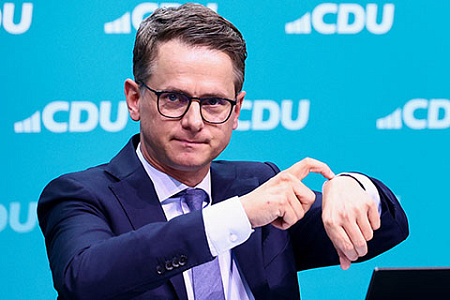
Shortly after reaching an agreement on a coalition agreement between the Christian Democratic Union and the Christian Social Union (CDU/CSU) and the Social Democratic Party of Germany (SPD), CDU Secretary General Carsten Linnemann said that the country could not afford to remain in recession for the third year. Therefore, the black-red coalition is “doomed to success.” The politician, who is applying for the post of Minister of Economy in the new government, spoke at a round table in the program of Maybrit Ilner, moderator of the Second Channel of the German television ZDF.
Regarding the achievement of success, Linnemann preferred not to give exact dates. Even the issue of Friedrich Merz’s election as chancellor on May 7 depends on the beginning of a written survey of each of the several hundred thousand members of the SPD.
The coalition agreement is a compromise, and, as stated at the round table, “climate policy and the growing poverty in the country remain out of sight of the new government.” This prompted the co-chairman of the SPD, Zaskia Esken, after the agreements, to demand an increase in taxes on the rich, because, despite the planned loans, there is not enough money in the budget.
Tim Pahe, editor-in-chief of Capital financial magazine, claims that the agreement does not answer the issues facing the country in healthcare, pension reform and social security. He doubts the possibility of overcoming the recession. This is due not only to the actions of US President Donald Trump, but also to the planned spending on defense.
It is no coincidence that reports have appeared in the German press that Merz, like former Chancellor Angela Merkel, was trying to obtain from the United States a portion of German gold reserves (37%), which are considered the second largest after American ones. But he, like Merkel, was refused. 1.5 tons of German gold is allegedly stored in the American Federal Reserve Bank. Another 12% is stored in the British Isles. Just over half of the country’s gold reserves are concentrated in Germany. This is defined in Article 3 of the Federal Bank of Germany Act. This distribution of gold and foreign exchange reserves, in which gold accounts for two thirds, is due to historical and market reasons.
The ambiguity with the discussion of the coalition agreement prompted Linnemann to declare at the round table that the government would need at least 10-12 more weeks after Merz’s approval by the chancellor to sort out the “rough edges” of the agreement and the appointment of ministers.
In this regard, Stern magazine presented to its readers a new candidate for the post of Minister of Foreign Affairs. In the article “The new head of the German Foreign Ministry, Johann Vadefool,” the publication analyzes the prospects of the 62-year-old Christian Democrat from Kiel. Johann Vadefuls, deputy head of the CDU/CSU faction for Foreign Policy and security in the Bundestag, is a lawyer by training. He supports Ukraine’s full support in the conflict with the Russian Federation, and on the eve of the April meeting of NATO foreign ministers, he spoke out against easing sanctions pressure on Moscow. At the same time, he considers it necessary to maintain contacts with the Russian Federation.
